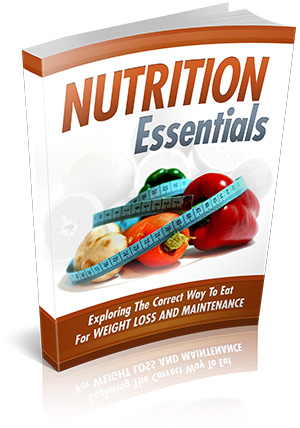Nutrition Essentials for Weight Loss : Summary and Download EBook
The Summary from “Nutrition Essentials.pdf” present a guide focused on achieving and maintaining weight loss through a proper understanding and application of nutritional principles.
The Ebook delves into the roles of specific macronutrients (proteins, carbohydrates, and fats) and provides guidance on making informed food choices, incorporating exercise, and the importance of hydration for successful and sustainable weight loss.

Nutrition Essentials for Weight Loss
Main Themes and Important Ideas/Facts:
1 : Knowledge as Power in Weight Loss: The Ebook repeatedly stresses the importance of understanding the nutritional information of food items to make informed choices. Ignorance can lead to negative consequences for one’s health and weight.
2 : The Food Pyramid is Not Designed for Weight Loss: While popular and a general nutritional guideline for health, the updated Food Pyramid is deemed insufficient and potentially misleading for individuals aiming to lose weight quickly. Its primary purpose is balanced nutrition, not weight loss guidance.
3 : Proteins are Essential for Weight Loss: Lean protein is highlighted as a critical component of a weight-loss diet due to its role in muscular development and boosting metabolic rate. Specific protein sources are recommended.
Psychology Of Weight Loss : Summary and Download EBook
4 : Carbohydrates are Necessary, but Proper Intake is Key: Carbs provide essential energy for the brain and muscles. The Ebook emphasizes balancing carb intake and distinguishing between “good” and “bad” carbohydrates. Tracking carb intake through a journal is recommended.
5 : Fats are Not Inherently Bad; “Good” Fats are Crucial for Health and Weight Loss: A no-fat diet is deemed dangerous. Essential fatty acids (“good” fats) are necessary for various bodily functions and can aid in weight loss by helping the body burn “bad” fats. Hydrogenated/trans fats are identified as detrimental.
6 : Organic and Raw Foods: Considerations for Weight Loss: Organic foods are defined by USDA standards, primarily focusing on the absence of certain modifications and treatments. While potentially beneficial for minimizing chemical exposure, the “organic” label does not automatically equate to “healthy” for weight loss. Calorie intake and nutrient density remain paramount.
7 : Fueling Exercise with the Right Foods is Important for Endurance: Eating low-calorie complex carbohydrates and adequate protein before exercise provides the necessary energy and supports muscle health. Timing and quality of food are emphasized.
8 : Maintaining Weight Requires Ongoing Effort and Smart Eating Habits: Weight gain can be rapid, while weight loss takes time. Maintaining weight loss requires a gradual and sustainable approach to diet, focusing on fresh, colorful, and varied foods consumed in moderation.
9 : Your View of Food Influences Your Weight: How an individual perceives food (as survival, indulgence, etc.) directly impacts their eating habits and ultimately their weight. A proper view, informed by knowledge, is essential for staying in shape.
10 : “Correct Diet” Differs from Simply “Dieting”: A correct diet involves a balanced and informed approach to eating, not deprivation or starvation, which can lead to temporary weight loss followed by regain and potential health issues.
11 : Weight Loss Success Requires a Holistic Approach: Sustainable and healthy weight loss is not solely dependent on diet but requires a combination of exercise, motivation, health, and proper nutrition.

Nutrition Essentials for Weight Loss
